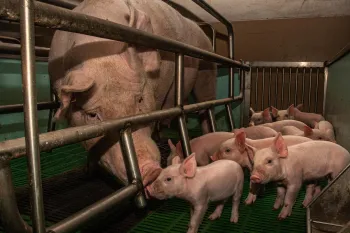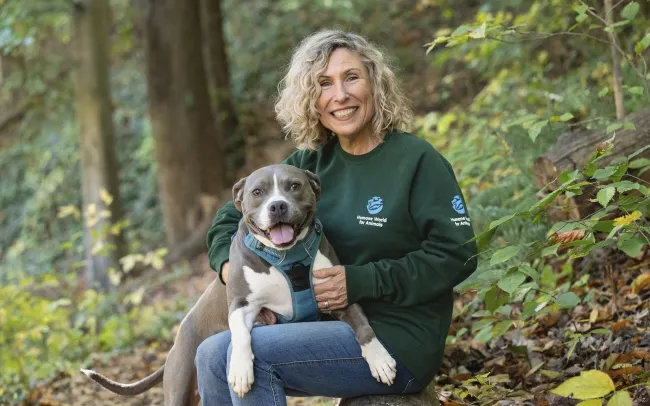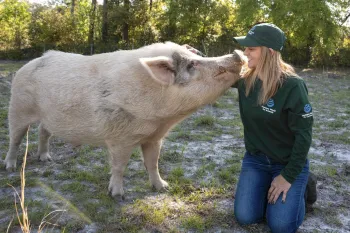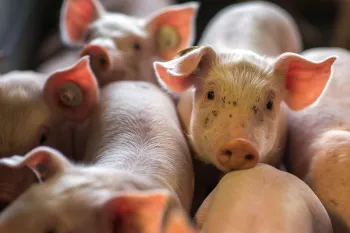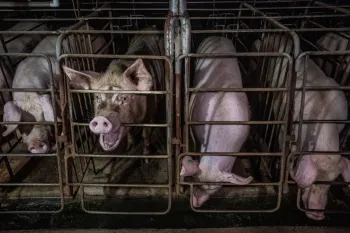A new poll on farrowing crates, which confine and restrict mother pigs behind bars for up to five weeks around the time of giving birth, shows that more than two thirds of people in Britain reject such cruelty. Humane World for Animals UK is calling for a ban on farrowing crates and for governments in the UK to support farmers in a transition to crate-free farming.
For years, we’ve been campaigning all over the globe to end the extreme confinement of farmed animals; this includes farrowing crates and gestation crates, which confine pigs throughout the length of their pregnancy, as well as veal crates for calves and battery cages for egg-laying hens. This is the very least we can do for animals who are used for food. It is more humane and in line with consumer expectations in the UK and many other countries.
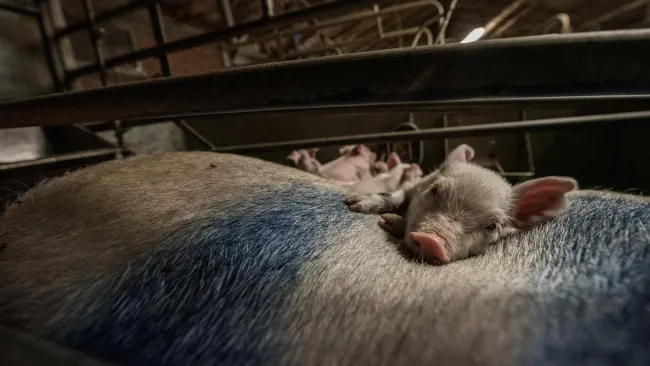
Stefano Belacchi/Essere Animali / We Animals Media
Mother pigs should not be forced to nurse their piglets through metal bars. And yet, in the UK alone, over 200,000 mother pigs spend nearly a quarter of their lives in metal cages so small that they cannot even turn around, let alone act on their strong maternal instincts to bond with their young.
Pigs are intelligent and emotional animals; living in such severely restrictive conditions commonly causes mental distress. Soon-to-be mother pigs would normally construct a nest of branches and leaves to comfort and protect their newborn piglets, and that strong nesting drive persists even in an agricultural setting. Before they give birth, crated sows are agitated and distressed because they cannot express their behavioral needs.
Farrowing crates were introduced over 50 years ago with the aim of preventing mother pigs from accidentally rolling over on their piglets in the limited space they are housed. Since then, several countries, such as Norway, have banned farrowing crates and adopted well-designed farrowing pens, and now report lower piglet mortality rates than countries that continue to use crates. In other words, when mother pigs are given space and specially designed pens, they tend not to accidentally crush their piglets. The push to produce larger litter sizes results in smaller piglets, who have more trouble getting out of the way. Farrowing crates are a cruel invention borne of the industrial farm system.
“A large majority of British people aren’t aware that pigs are locked up in cruel cages for five weeks at a time to give birth, but when we raise awareness of their suffering, almost 70% of people felt that pigs should only be permitted to be confined for up to a few hours,” Claire Bass, senior director of campaigns and public affairs at Humane World for Animals UK, said. “The poll also shows a significant proportion of people (34%) would be prepared to pay more for products from animals who had not been confined. There is no reason for this cruelty to continue, especially when free-farrowing systems are available and are proven to provide better welfare outcomes for both sows and piglets. Many farmers are ready to transition away from farrowing crates, but they urgently need the right policy and support from governments to make it happen.”
Last year, Humane World for Animals UK began working with British farmers and veterinarians who agree that mother pigs are suffering unacceptably for weeks behind bars. One farmer gave us exclusive images, videos and a heartbreaking account of the suffering pigs experience in crates so that our team could show policymakers the reality and make an urgent case for action. They also agreed to allow us to rescue and rehome two mother pigs at the end of their breeding lives. Our friend and animal champion Leona Lewis led a competition to name them ‘Hope’ and ‘Blossom’ and they now feature as compelling ambassadors in our campaign for a ban, living out the rest of their lives free and unrestrained at Hopefield Animal Sanctuary.
We are working in many countries to end the cage age for farmed animals. In the U.S., for example, we’ve made the end of gestation crates, the cause of so much suffering, an urgent priority. We’ve documented cases of pigs in gestation crates chewing the bars of their cages until their mouths bleed. Public outcry has given this effort a big lift and resulted in the passage of laws against the practice in several states. Many farmers have also endorsed and adopted practices that no longer use extreme confinement.
Simply put, there is no way to justify the continuation of this form of cruelty. Alongside our plant-based advocacy, our work to eliminate cruel confinement is making strides to create more compassionate food systems. For the animals in the food system right at this moment, such changes cannot come too soon.
